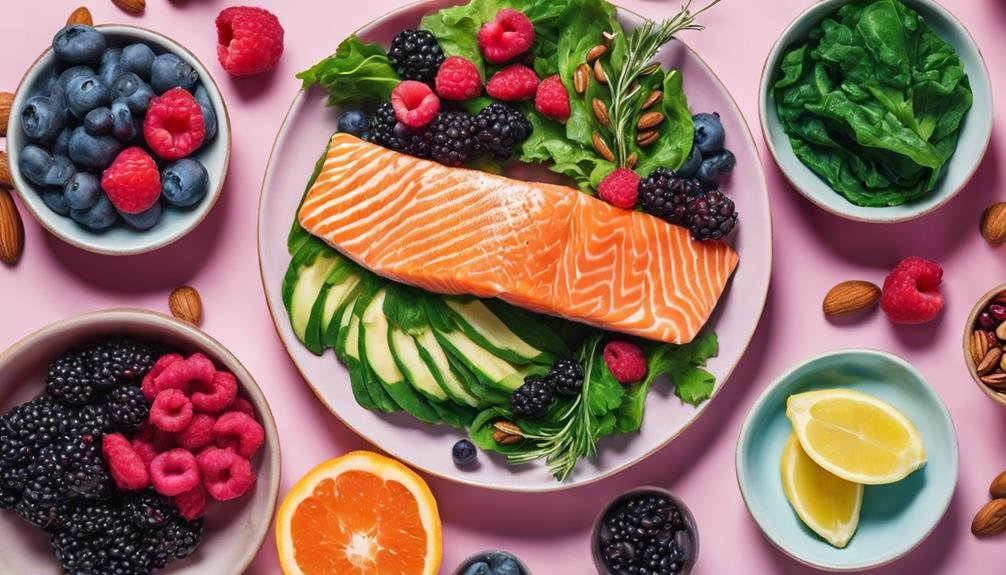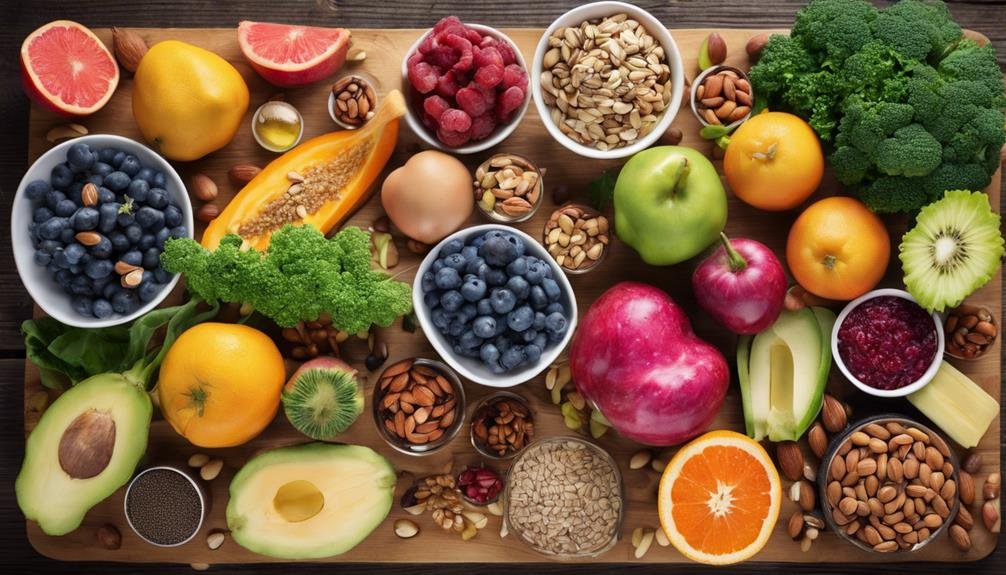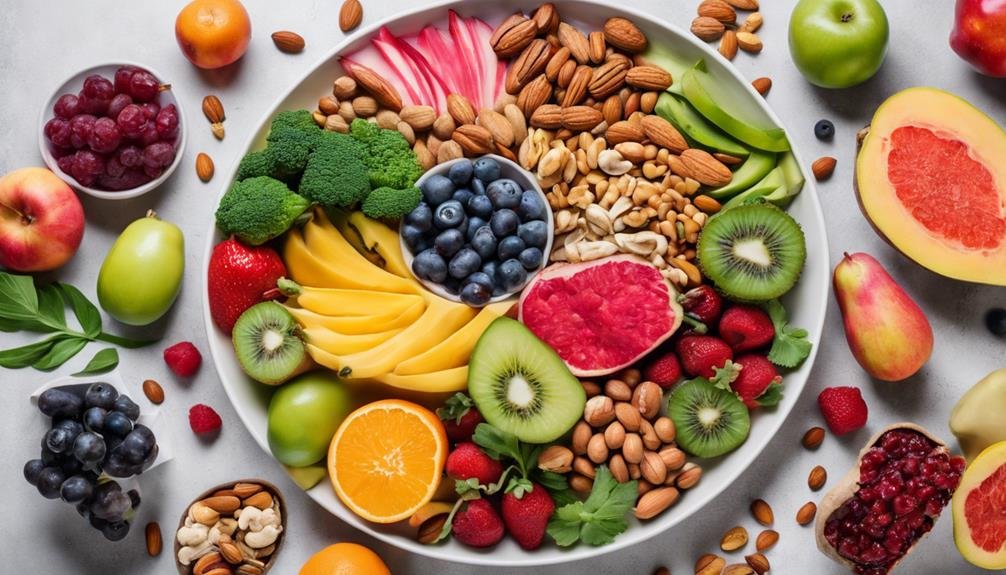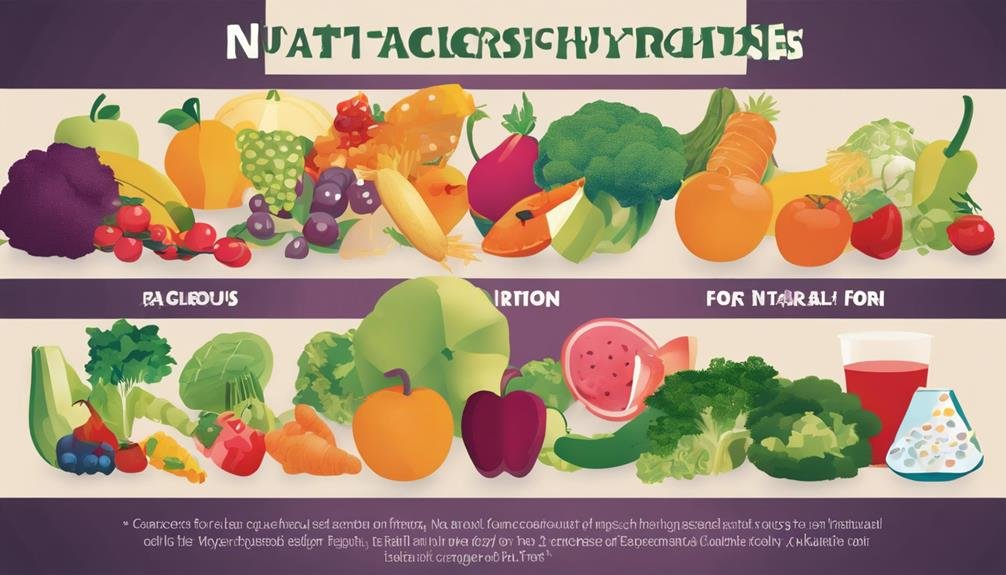When considering a Paleo diet for cancer recovery, you may be curious about the specific foods that can play a crucial role in supporting your journey. Certain items like leafy greens, berries, and wild-caught fish have been praised for their potential benefits in combating cancer. But what about lesser-known options like bone broth, coconut oil, and herbal teas? These additions might just surprise you with their healing properties and unique contributions to your overall well-being. Intrigued to learn more about how these foods can aid in your recovery journey?
Leafy Greens
Leafy greens are a crucial component of the Paleo diet, especially beneficial for those on the journey of cancer recovery. Spinach, kale, and Swiss chard are rich in vitamins, minerals, and antioxidants that can support your body during this challenging time. These greens are packed with folate, a B vitamin that aids in DNA synthesis and repair, crucial for cells that are constantly regenerating during cancer treatment.
Additionally, the high fiber content in leafy greens can help regulate blood sugar levels and support a healthy gut microbiome, which is essential for overall health and immune function.
Moreover, leafy greens contain compounds like sulforaphane and chlorophyll, which have been shown to have anti-cancer properties by promoting detoxification and reducing inflammation in the body. Including a variety of leafy greens in your diet can provide a wide range of nutrients that may help boost your immune system and support your body's natural healing processes.
Remember to incorporate these vibrant greens into your meals regularly to reap their health benefits as you navigate your cancer recovery journey.
Berries
Rich in antioxidants and phytonutrients, berries are a powerhouse addition to your Paleo diet, especially beneficial for those focusing on cancer recovery. Berries like blueberries, raspberries, and strawberries are packed with compounds that have been shown to have anti-cancer properties. These fruits contain high levels of anthocyanins, ellagic acid, and vitamin C, which can help combat oxidative stress and inflammation in the body, two factors that play a role in cancer development.
Studies have shown that the phytochemicals present in berries can help inhibit the growth of cancer cells and reduce the risk of tumor formation. Additionally, the fiber content in berries supports gut health and aids in digestion, which is essential for overall well-being, especially during cancer recovery.
Including a variety of berries in your Paleo diet can provide you with a delicious way to boost your antioxidant intake and support your body's natural healing processes. Consider adding a handful of mixed berries to your meals or snacks daily to reap the benefits of these cancer-fighting fruits.
Cruciferous Vegetables
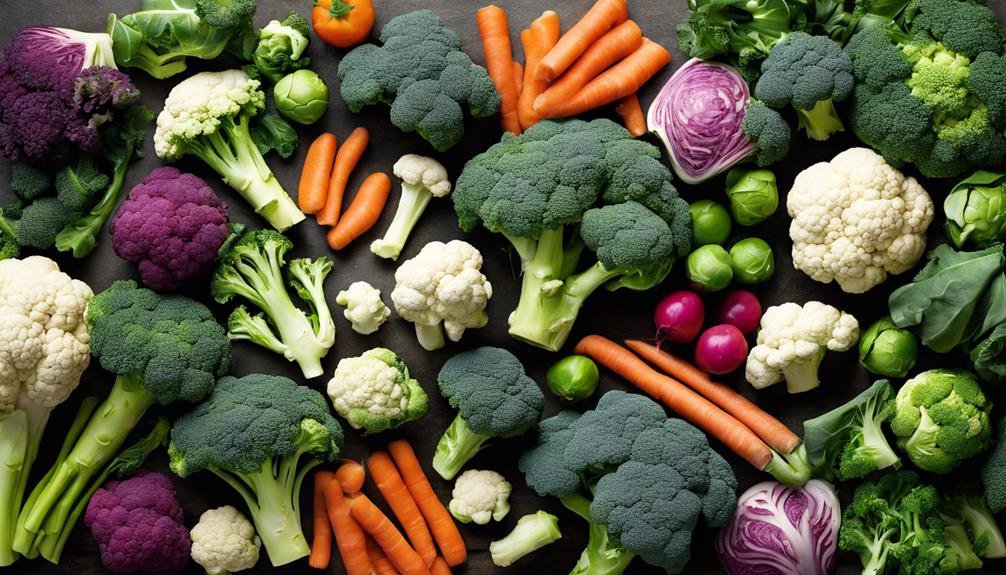
Cruciferous vegetables, such as broccoli, cauliflower, and Brussels sprouts, are renowned for their potent cancer-fighting properties. These veggies are packed with nutrients that can support your body in its recovery journey. Here's why they're beneficial for cancer recovery:
- Rich in Sulforaphane: Cruciferous vegetables contain sulforaphane, a compound that has shown potential in inhibiting the growth of cancer cells.
- High in Antioxidants: These vegetables are abundant in antioxidants, which help protect your cells from damage caused by free radicals.
- Anti-Inflammatory Properties: Cruciferous veggies have anti-inflammatory effects that can assist in reducing inflammation, which is often associated with cancer progression.
- Detoxification Support: They support your body's natural detoxification processes, aiding in the elimination of toxins that could contribute to cancer development.
Incorporating cruciferous vegetables into your Paleo diet can be a delicious and nutritious way to enhance your body's ability to fight cancer and promote recovery.
Wild-caught Fish
Continuing on your journey towards cancer recovery with your Paleo diet, let's now shift our focus to wild-caught fish.
Wild-caught fish, such as salmon, mackerel, and sardines, are rich in omega-3 fatty acids, which have been shown to have anti-inflammatory properties and may aid in cancer recovery. These fatty acids can help reduce inflammation in the body, support the immune system, and potentially slow the growth of cancer cells.
In addition to omega-3 fatty acids, wild-caught fish are excellent sources of high-quality protein, vitamins, and minerals that are essential for overall health and well-being. The protein in fish can help with tissue repair and muscle maintenance, which are crucial during cancer treatment and recovery.
When incorporating wild-caught fish into your Paleo diet, aim to choose varieties that are sustainably sourced to support both your health and the environment. Including wild-caught fish in your meals can provide valuable nutrients that may aid in your journey towards cancer recovery.
Bone Broth
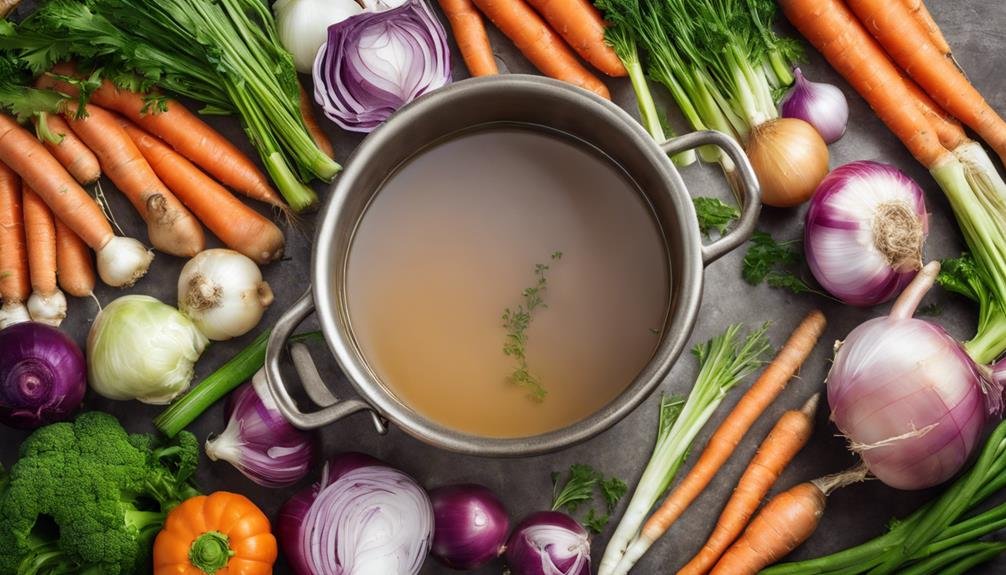
When looking to enhance your Paleo diet for cancer recovery, consider incorporating bone broth into your meals. Bone broth is a nutritious addition that offers various benefits to support your health journey:
- Rich in Nutrients: Bone broth is packed with essential vitamins and minerals like calcium, magnesium, and phosphorus, which are vital for bone health and overall well-being.
- Gut Healing Properties: The gelatin found in bone broth helps repair and maintain the gut lining, supporting digestion and nutrient absorption.
- Anti-Inflammatory Effects: The amino acids in bone broth, such as glycine and proline, have anti-inflammatory properties that may aid in reducing inflammation in the body.
- Hydration and Electrolyte Balance: Bone broth is hydrating and contains electrolytes like potassium and sodium, which are crucial for maintaining proper fluid balance and supporting nerve function.
Incorporating bone broth into your diet can provide a nourishing boost that complements your cancer recovery efforts.
Turmeric
After exploring the benefits of bone broth for your cancer recovery journey, let's now shift our focus to another valuable addition to your Paleo diet: turmeric.
Turmeric, a vibrant yellow spice commonly found in curry dishes, contains a powerful compound called curcumin. Research suggests that curcumin has anti-inflammatory and antioxidant properties that could potentially aid in cancer recovery. Studies have shown that curcumin may help inhibit the growth of cancer cells, reduce inflammation, and even enhance the effectiveness of certain cancer treatments.
Adding turmeric to your meals or consuming it as a supplement may be beneficial for supporting your overall health during cancer recovery. Remember to consult with your healthcare provider before making any significant changes to your diet, especially if you're undergoing cancer treatment. Including turmeric in your Paleo diet can be a flavorful way to potentially complement your journey towards recovery.
Avocado
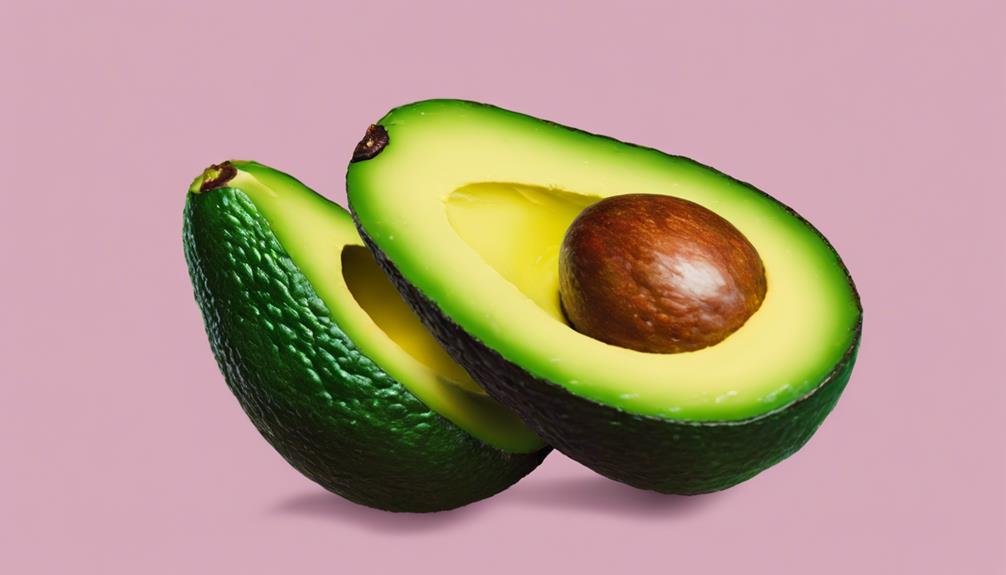
Adding avocados to your Paleo diet can offer numerous benefits during your cancer recovery journey. Avocados are nutrient-dense fruits that provide essential vitamins, minerals, and healthy fats to support your overall health and well-being. Here are some reasons why incorporating avocados into your diet can be beneficial:
- Rich in Monounsaturated Fats: Avocados are a great source of heart-healthy monounsaturated fats, which can help reduce inflammation and support a healthy cardiovascular system.
- Loaded with Fiber: Avocados are high in fiber, promoting digestive health and aiding in weight management.
- Packed with Potassium: Avocados are an excellent source of potassium, essential for maintaining proper electrolyte balance and supporting muscle function.
- Abundant in Antioxidants: Avocados contain powerful antioxidants like vitamin E, which can help protect your cells from damage and boost your immune system.
Nuts and Seeds
Incorporating nuts and seeds into your Paleo diet can significantly enhance your cancer recovery journey. Nuts like almonds, walnuts, and Brazil nuts are packed with essential nutrients that support your body's healing process. These nutrient powerhouses provide a good source of healthy fats, protein, fiber, vitamins, and minerals.
Seeds such as chia seeds, flaxseeds, and pumpkin seeds are also beneficial additions to your diet. They're rich in antioxidants, omega-3 fatty acids, and fiber, which can help reduce inflammation and support your immune system during cancer treatment.
Studies have shown that the consumption of nuts and seeds is associated with a lower risk of certain types of cancer and can aid in managing side effects of cancer treatments like fatigue and inflammation. Including a variety of nuts and seeds in your meals and snacks can provide your body with the necessary nutrients to promote healing and recovery.
Grass-fed Meat
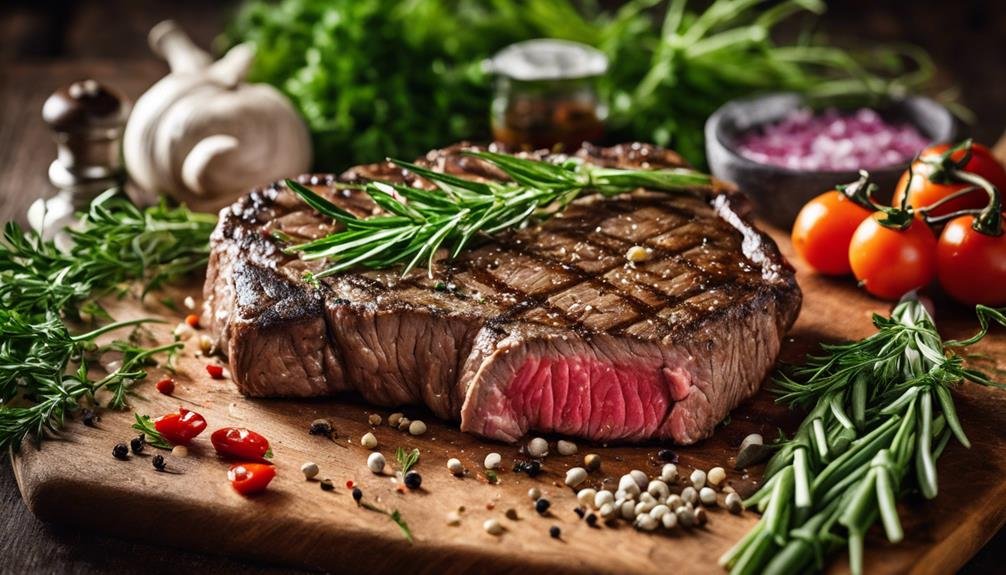
Nuts and seeds have laid a solid foundation for your cancer recovery journey by providing essential nutrients and support to your body. Now, let's talk about the benefits of incorporating grass-fed meat into your diet:
- High Omega-3 Content: Grass-fed meat is rich in omega-3 fatty acids, which have anti-inflammatory properties and can support your body's recovery process.
- Quality Protein Source: Grass-fed meat is a high-quality protein source that can help in rebuilding tissues and supporting your immune system during cancer recovery.
- Nutrient Density: Grass-fed meat is packed with essential nutrients like iron, zinc, and vitamins B6 and B12, which are crucial for maintaining energy levels and overall health.
- No Added Hormones or Antibiotics: Opting for grass-fed meat ensures that you're consuming a cleaner protein source without the added hormones or antibiotics found in conventionally raised meat.
Including grass-fed meat in your diet can be a valuable addition to support your body's healing journey during cancer recovery.
Coconut Oil
During your cancer recovery journey, coconut oil can play a beneficial role in supporting your body's healing process. Coconut oil contains medium-chain triglycerides (MCTs) that are easily digestible and can provide a quick source of energy for your body. These MCTs have been shown to have potential anti-cancer effects by inhibiting the growth of certain types of cancer cells.
Additionally, coconut oil is rich in lauric acid, known for its antimicrobial properties, which may help support your immune system during recovery.
Incorporating coconut oil into your diet can be as simple as using it for cooking, baking, or adding it to your smoothies. Be mindful of portion sizes, as coconut oil is calorie-dense. Aim for moderation and consult with your healthcare provider or a nutritionist to determine the right amount for you.
Garlic
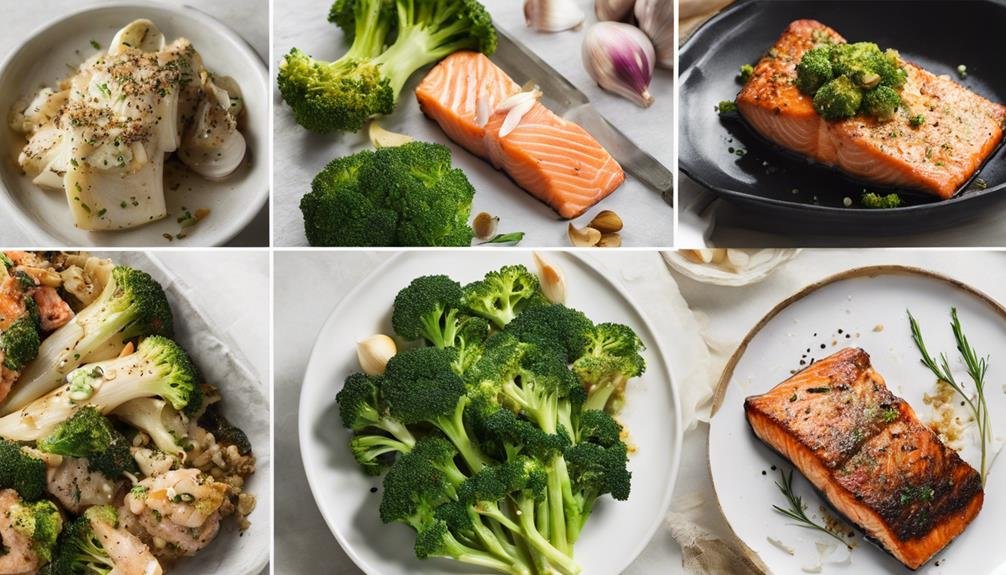
Garlic, a versatile and flavorful ingredient, holds potential health benefits that can support your journey towards cancer recovery. This powerful bulb not only adds depth to your dishes but also offers significant support in your healing process. Here's why garlic should be a staple in your diet:
- Allicin: Garlic contains allicin, a compound known for its anti-inflammatory properties, which may help reduce inflammation in the body.
- Antioxidants: Packed with antioxidants, garlic can help combat oxidative stress and protect your cells from damage.
- Immune Support: Garlic is believed to enhance immune function, supporting your body's natural defense mechanisms.
- Anti-Cancer Properties: Studies suggest that garlic may have anti-cancer effects, potentially inhibiting the growth of cancer cells.
Herbal Teas
Rich in both flavor and potential health benefits, herbal teas can be a soothing addition to your diet as you navigate your journey towards cancer recovery.
Herbal teas like green tea, chamomile tea, and ginger tea are known for their antioxidant properties, which can help combat inflammation and oxidative stress in the body, both of which play a role in cancer development and progression.
Green tea, in particular, contains compounds like catechins, which have been studied for their potential anti-cancer effects.
Chamomile tea is known for its calming properties, which can help reduce stress and promote better sleep during your recovery process.
Ginger tea is often used to alleviate nausea, a common side effect of cancer treatments.
Including these herbal teas in your daily routine can't only provide comfort but also contribute to your overall well-being as you work towards recovery.
Frequently Asked Questions
Can Processed Meats Be Included in a Paleo Diet for Cancer Recovery?
Yes, including processed meats in a Paleo diet for cancer recovery is generally not recommended. Processed meats often contain additives and preservatives that may not support your body's healing process.
Instead, focus on incorporating lean proteins like poultry, fish, and plant-based protein sources that are nutrient-dense and can help promote overall health and recovery. Choosing whole, unprocessed foods is key to supporting your body during cancer recovery.
Are There Any Specific Guidelines for Portion Sizes of These Foods?
When considering portion sizes of foods in the Paleo diet, it's essential to listen to your body's hunger cues and eat until you feel satisfied, not overly full.
A good rule of thumb is to fill half your plate with vegetables, one-quarter with protein sources like lean meats or fish, and one-quarter with healthy fats like nuts or avocados.
Portion control helps maintain a balanced diet and supports overall well-being.
Can Fruits High in Natural Sugars Be Consumed on a Paleo Diet?
Yes, fruits high in natural sugars can be consumed on a paleo diet, but moderation is key. Opt for fruits like berries, which are lower in sugar compared to tropical fruits.
For example, you could enjoy a cup of mixed berries with breakfast. This way, you get the benefits of antioxidants and fiber from fruits without consuming excessive amounts of sugar that could potentially impact your health goals.
How Can Someone on a Budget Afford These Paleo-Friendly Foods?
To afford paleo-friendly foods on a budget, prioritize essentials like lean meats, eggs, vegetables, and fruits in season.
Opt for frozen or canned options when fresh produce is costly. Buy in bulk, look for sales, and consider joining a local co-op or farmer's market.
Planning meals in advance and cooking at home can save money. Remember, investing in your health now can lead to long-term benefits.
Are There Any Potential Side Effects of Consuming These Foods in Excess?
Consuming paleo-friendly foods in excess can lead to potential side effects like nutrient imbalances or increased cholesterol levels. Moderation is key when incorporating these foods into your diet.
Think of it like a balanced scale – too much of a good thing can tip the balance. Be mindful of portion sizes and listen to your body's signals.
Consulting with a healthcare provider or nutritionist can help ensure you're getting all the benefits without the risks.
Conclusion
As you incorporate nutrient-dense foods like leafy greens, berries, and wild-caught fish into your Paleo diet, envision your body as a thriving garden, nourished by the vibrant colors and flavors of nature. These foods not only aid in cancer recovery but also serve as powerful allies in your journey towards holistic health and well-being. Embrace the healing power of whole, unprocessed foods and watch as your body blooms with vitality and strength.
